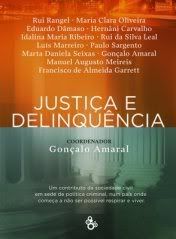On the 25th of June, former PJ inspector Gonçalo Amaral presents a book, in Lisbon, that reunites texts from judiciary professionals and operators, among others, about criminality in Portugal Gonçalo Amaral has coordinated the book ‘Justice and Delinquency’, which compiles opinions and proposals for solutions from judges, prosecutors, lawyers, a criminal investigation coordinator, a journalist, a university professor and a psychologist.
Gonçalo Amaral has coordinated the book ‘Justice and Delinquency’, which compiles opinions and proposals for solutions from judges, prosecutors, lawyers, a criminal investigation coordinator, a journalist, a university professor and a psychologist.
In the book, he sustains that policemen must act in a “pro-active” manner, performing a “previous study of criminal means and of the usual crime agents”, among others, reuniting all “necessary” elements for the “capture of its author”.
Rui Rangel, a senior judge and the president of ‘Associação de Juízes pela Cidadania’ [‘Judges for Citizenship Association’], participated in the project, in which he expresses that violence has “undermined all of the social fabric” and defends measures like the “increase of video surveillance”, “intense and frequent ‘searches’ at the entrance of entertainment areas” and a “revision of the Penal Code with an increase of sentences”.
Concerning applicable sentences, judge Maria dos Santos Ribeiro underlines that the convicts do not wish for a substitution of sentences for community work, favouring “the discreet sacrifice of their freedom over the public ostentation of their financial incapacity to pay the fine”.
Prosecutor Maria Clara Oliveira, on the other hand, believes that present society “favours solitary living”, to which the “chaos of the table of values”, the “inefficacity in the fight against excesses”, the economical crisis and the “reappearance of dictatorial regimes” are added.
Marta Daniela Seixas, a joint prosecutor, also criticises the “intense” family and social values’ crisis in Portugal, recalling that school abandonment contributes to the “increase of juvenile criminality”.
On the contrary, psychologist and teacher Paulo Sargento dos Santos considers that the relationship between crisis and crime is “political demagogy” and suggests an intervention at the level of “unstructured urban ecologies”, in order to avoid an “excessive concentration of citizens with poor economical and social resources on the borders of big cities”.
Journalist and criminal psychologist Hernâni Carvalho defends that the problem does not originate in social neighbourhoods, recalling that “everyone was pushed into them over time” and all of them were “sponsored by the State”.
Lawyer Rui da Silva Leal admits that there “are measures to be taken” at the sociological, school and educational level, but before that, action within Justice has to be taken – the “full execution of applied sentences” should be imposed – in order to return the feeling of security to populations.
Teacher Manuel Augusto Meireis shares his thoughts about stereotypes that are created by society and stresses that formal and informal control instances “have been contributing decisively to the bad image of penal Justice”.
Francisco Almeida Garrett, a lawyer, alleges that the increase of criminality in Portugal “is not conjunctural” but rather “structural” and that the system is preoccupied “almost exclusively with the defence of prevaricators”.
The lawyer even foresees that “in a few years the magistrates themselves will be beaten and killed over motives that are related to the exercise of their functions”.
The presentation of the book ‘Justice and Delinquency’ is scheduled for the 25th of June at Alethea bookshop, in Lisbon.
Gonçalo Amaral, who has meanwhile retired from the PJ, initially coordinated the investigation into the disappearance of little English girl Madeleine McCann, in May 2007, in Praia da Luz, Lagos, Algarve.
In the book that he published under the title ‘Maddie – The Truth about the Lie’, Gonçalo Amaral considers that “the child died in the apartment on that day”.
Meanwhile, Gonçalo Amaral was condemned in May by the Court of Faro to one year and six months in prison over false testimony, with a suspended sentence for the same period, in the trial of alleged aggressions against Leonor Cipriano, the mother of little girl Joana Cipriano.
The process of alleged aggressions against Leonor Cipriano by PJ inspectors is related to the so-called ‘Joana case’, which dates back to September 2004, when the child disappeared from the village of Figueira, Portimão, in the Algarve.
source: Lusa/Sol, 17.06.2009

|
| Title: Justice and Delinquency June 17, 2009 | |
| MadeleineMcCann > BOOKS > Goncalo Amaral Books | Go to subcategory: |
| Author | Content |
|
TinLizzy
|
|
|
Date Posted:04/21/2011 9:57 PMCopy HTML http://proud-of-the-pj.blogspot.com/2009/06/justice-and-delinquency.html
Wednesday, June 17, 2009"Justice and Delinquency"Gonçalo Amaral launches compilation of texts about criminality |
Copyright © 2000- Aimoo Free Forum All rights reserved.







